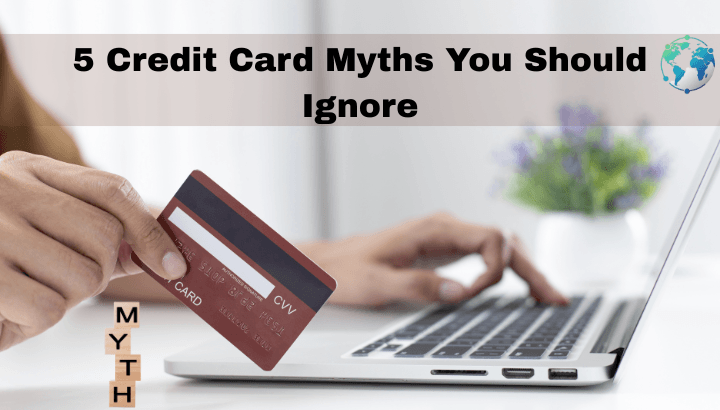Credit cards are becoming popular day by day and they can be a really useful financial tool if you know how to use them wisely and smartly. But many people have some myths related to credit cards and that lead them to a big debt trap.
When used the right way, credit cards are a powerful tool. But wrong beliefs about them can hurt your financial situation.
In this article, we will break down the top 5 credit card myths you should not believe at any cost and explain what’s actually true. Whether you are using a credit card for the first time or want to improve your credit score, this guide will help you understand things better.
Let’s dive into the most common credit card myths and learn facts behind them in detailed and simple form.
Top 5 Credit Card Myths in 2025
Carrying a Balance Improves Your Credit Score
The Myth:
Some people think that not paying off the full amount on their credit card before the due date helps build a better credit score, but that’s just a most common myth.
The Truth:
This is absolutely wrong. Because carrying a balance means you pay extra money as interest and it keeps on adding up over time, which doesn’t help your credit score. The smart way to build your credit score is to pay your full bills every month.
Why It Matters:
Two major things that affect your credit score are your payment history and credit utilization, like how much of your credit limit you are using. If you keep a high balance, your credit utilization goes up and that can lower your credit score.
Pro Tip:
Always try to pay your full balance before the due date every month. This helps you avoid interest and keeps your credit score strong.
Closing a Credit Card Helps Your Credit Score
The myth:
Many people believe that closing a credit card they don’t use anymore will improve their credit score and that’s the most confusing myth for most people.
The Truth:
Closing a credit card can actually hurt your credit score, especially if it’s an old card or one with a high credit limit. It can lower your score by reducing your total available credit and increasing your credit utilization ratio.
Why It Matters:
When you close a card, your total available credit goes down. This can make your credit utilization ratio go up, which may lower your credit score.
Also, closing an old credit card can reduce the average age of your credit history. A shorter credit history can negatively affect your score.
Pro Tip:
If your credit card doesn’t have an annual fee, it is better to keep it open. Use it once in a while so it stays active and help in managing your financial goals for future.
You Need to Use Your Entire Credit Limit to Build Credit
The Myth:
Another myth most people have is that they think that using most or all their credit limit will help them build credit faster.
The Truth:
But the actual truth is that using too much of your available credit can actually lower your credit score. Lenders may see this as a sign that you are having money problems, that’s why you are using the entire credit limit.
Why It Matters:
Experts say it’s best to keep your credit utilization below 30% always, and if possible, under 10% for the highest credit scores.
Pro Tip:
Make small purchases on your credit card and pay them off in full before the due date. This shows lenders that you use credit wisely without going near your full credit limit.
Credit Cards Are Only for People with Good Credit
The Myth:
Many people believe you must have a high credit score to get a credit card.
The Truth:
There are credit cards for all credit types. Even if you have no credit history or low credit. These include secured credit cards and starter cards.
Why It Matters:
A secured credit card is a great way to build or rebuild credit. It works like a regular card but needs a refundable deposit as security.
Pro Tip:
If you are new to credit or fixing past mistakes, start with a secured card. Use it carefully and pay on time before the due date. With time, you can move on to better cards with more credit limits and rewards.
Using Credit Card Means You’ll Go Into Debt
The Myth:
A lot of people avoid applying for credit cards because they think they will end up in debt.
The Truth:
But the truth is that they don’t create debt by themselves. It’s only when people spend more than they can repay or when they skip payments, then they go into debt. If used smartly, credit cards can help you earn rewards, protect your money, and boost your credit score.
Why It Matters:
If you use your credit card to pay monthly bills and then pay the full amount back every month, then you can build a strong credit score without paying any extra interest.
Many credit cards also give you cashback, travel discounts, coupons, and protection against fraud.
Pro Tip:
Use your credit card like you use your debit card. And it can be done by only spending what you can afford to pay back. And make sure to always pay on time.
Conclusion
Credit cards can be really helpful when used the right way. They can help you manage your money, build credit, and even save money through rewards and offers. But it’s really important to use them carefully and not believe in the common myths people talk about.
If you understand how credit cards really work, you can make smart choices and avoid getting into debt or hurting your credit score.
By not believing in these credit card myths, you are already moving toward financial success.
FAQs
Is it true that carrying a balance boosts your credit score?
No. Carrying a balance means you will pay extra money as interest. To boost your credit score, just pay on time and keep your credit utilization low i.e., under 30% is best.
Will closing an old credit card improve my credit score?
Usually not. Closing a card can lower your available credit and make your credit history shorter. Both of these can hurt your credit score.
Do I need to use my full credit limit to improve my credit?
No. It’s better to use only a small part of your credit limit and pay the full amount every month. Using too much of your limit can lower your credit score.
Can I get a credit card with no credit or bad credit?
Yes. You can start with a secured credit card or cards made for beginners. These are good for building your credit if you use them the right way.
Will using credit cards lead to debt?
Not if you’re careful. You get into debt when you spend more than you can afford and don’t pay the full amount before the due date.

